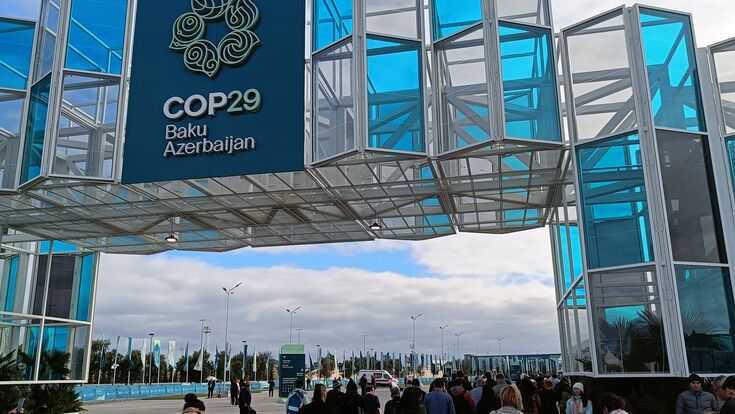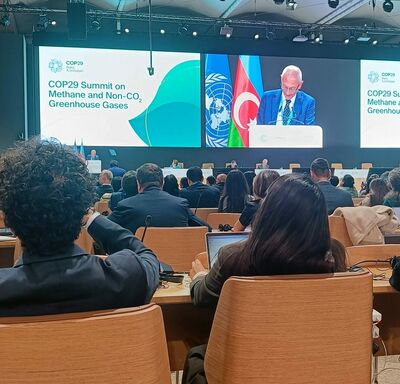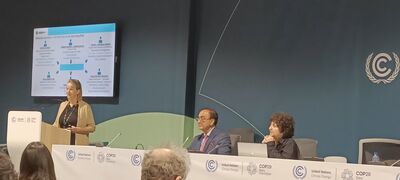News from Baku : Putting Waste on the COP29 Agenda

COP29 is a pivotal moment for the waste and resources sector, marking the first time a COP declaration has formally included waste. The COP29 Declaration on Reducing Methane from Organic Waste will push for national climate policies that set concrete targets to reduce methane from waste and food systems, aligning with the 1.5°C goal.
Methane contributes to half a degree of current warming and has 80 times the warming effect of CO2 over 20 years. According to the Global Methane Pledge, founded at COP26, to keep the 1.5°C limit within reach, methane emissions must drop by 30–60% by 2030 alongside CO2 reductions.
After agriculture (40%) and fossil fuels (35%), waste (20%) from food and other organic materials left in landfills, open dumps, and wastewater, is the third largest source of methane emissions worldwide. It seems only logical to have a special focus on when fighting climate change.
Opening of the Waste and Resources Pavilion
In his opening remarks at the Waste and Resources Pavilion ISWA’s new president, James Law, also highlighted the important role the waste sector can and must play in mitigating climate change. The significant link between waste and climate change means sound waste management needs to be high on the global climate agenda. Therefore, ISWA strongly encourages member states to include integrated waste and resource management strategies and initiatives in their Nationally Determined Contributions (NDCs) as part of their efforts to combat climate change.
“Tackling waste mismanagement”, James Law said, “provides an opportunity to reduce 15 to 20% of global anthropogenic GHG emissions.” But of course, sound waste management needs money. Especially when looking at the global disparity in waste management, this is a challenge in itself. Hopefully, this year’s “finance COP” discusses – and brings- solutions.
Tackling waste mismanagement provides an opportunity to reduce 15 to 20% of global anthropogenic GHG emissions.James Law said, ISWA President
Peter Simoes, Chair of ISWA’s Working Group on Climate Change & Waste Management, discussed the outcome of the Global Waste Management Outlook 2 (GMWO2), published earlier this year by UNEP and ISWA, which shows that waste generation will continue to grow. To address this issue, ISWA in their Declaration to COP29 focused on four topics:
- Circular waste and resources management address the triple planetary crisis
- Organic waste management towards a low carbon future
- Set global waste and resource management goals
- Structure financing models and funding mechanisms
Simoes also drew attention to an important fact: Waste management reduces emissions in the waste sector but also in other sectors.
COP Presidency has waste on their agenda
The importance to shine a light and ultimately fight methane and other non-CO2 emissions has finally reached the high-level discussions at COP. The United States, the People’s Republic of China, and Azerbaijan held a summit aimed at accelerating efforts to reduce emissions of said greenhouse gases.
The direction of the event was clear: There are already several initiatives and actions in place to mitigate methane and Co. but – there was a big but in nearly every presentation – more, much more needs to be done.
Senior Advisor to the US President for International Climate Policy John Podesta discussed US legislation to reduce methane emissions, adding with fervor that the processes cannot be stopped. He called for more unity and collaboration closing his remarks by saying: “For our sake and for our children’s sake: Failure is not an option.”
COP29 President Mukhtar Babayev argued that we must address all emissions sources, first and foremost agriculture and organic waste. This is the reason the COP Presidency included organic waste in their declarations. According to him the Reducing Organic Waste Declaration will drive urgent action on waste management and cut methane emissions in the waste sector this decade. He urged countries to include diverting organic waste from landfills and reducing food waste in their NDC.

Our message to those who emit methane is clear: you can run, but you can’t hide.Steven Guilbeault, Minister of Environment and Climate Change, Canada
International Energy Agency (IEA) Executive Director Fatih Birol called on Parties to the Paris Agreement to heed the COP 28 Global Stocktake call to deliver 1.5C-aligned 2035 Nationally Determined Contribution (NDC) targets covering all greenhouse gases, and to set net zero targets covering all greenhouse gases. “Minimizing methane emissions is also a good plumbing issue,” he said. “Make your tubes tighter.”
Canada’s Environment Minister, Steven Guilbeault, unveiled draft regulations aiming to cut landfill methane emissions by half from 2019 levels by 2030 and introduced caps on emissions from oil, gas, and LNG production to further drive methane reductions. “Our message to those who emit methane is clear: you can run, but you can’t hide.”
All in all, the partners agreed to the following:
- Finance: Over $2 billion in international grants and billions more in investments mobilized over the past three years to address super pollutants.
- Policy: New regulations aimed at reducing methane emissions in the oil, gas, and landfill sectors, including from five of the top 20 methane emitters.
- Science: Launch of the first Global Nitrous Oxide Assessment, showing a potential 40% reduction in N2O emissions, alongside new efforts to track and reduce the climate impact of tropospheric ozone.
Busy day at the ISWA Pavilion
The third day of the UN climate conference was quite busy for ISWA. The morning began with a panel discussion under the title “How should we reflect the waste sector in climate mitigation and adaptation? “. Moderated by Anja Schwetje, Vice-Chair of the ISWA Working Group on Climate Change and Waste Management Aditi Maheshwari, Managing Director of Climate Action Implementation, C40 Cities, Dr Pradeep Monga, Senior Advisor and Policy Director of the World Biogas Association (WBA), Ana Catalina Suárez Peña, Senior Director of Strategy and Innovation, Global Foodbanking Network (GFN) Columbia, Keith James, Head of Policy and Insights, WRAP, UK, Adriana Gomez, Scholar, Energy, Climate, and Environment Program, International Institute for Applied Systems Analysis (IIASA), Austria, explored the waste sector's role in preventing waste, utilizing organic materials, supporting recycling, and advancing bioeconomy efforts.
In the afternoon ISWA president and Chair of the Working Group on Landfills James Law, Dr Amani Maalouf, senior researcher, University of Oxford, UK, Peter Simoes, Chair of the ISWA Working Group on Climate Change and Waste Management and Prof Sahadat Hossain, Director of the Solid Waste Institute for Sustainabilty (SWIS) at the University of Texas, Arlington spoke about the impact of management choices on landfills and closing dumpsites. A lively crowd listened to the experts talking about the challenges in closing dumpsites, the lack of consistent waste statistics and data on the informal waste sector and the necessity to consider the socio-economic effects. Prof Hossain also presented the plastic road he is working on in his lab. He is turning waste plastic into road construction material.
No level playing field for the waste sector
Anja Schwetje also took part in the side event “Unlocking the potential for financing methane mitigation from solid waste for the NDCs and beyond” hosted by the World Biogas Association (WBA) and co-hosted by ISWA.
Martina Otto, Head of Secretariat of the Climate and Clean Air Coalition (CACC) opened the event with a keynote on the importance and urgency of the Global Methane Pledge.
Charlotte Morton OBE, Chief Executive of the WBA argued that we live in a world where industries that cause harm don’t have to pay for it. They are much rather given enormous subsidies. “It’s hard for green industries to compete”, she said.
Anja Schwetje argued in much the same way: “There is no level playing field between the sectors but also not within the sector”, she said. “Dumping is cheap, for example. And as long as fossil fuels and chemical fertilizers are heavily subsidized there is no level playing field for biogas and organic fertilizer.”
Another problem is that the capital market likes big, huge projects. Waste management projects very often are small(-ish) so getting funding is hard.
But it’s not only the policy makers that lack the willingness to support green industries and the investors and banks, who are reluctant to fund sustainable projects. “We are ready to pay for our consumption but are we ready to pay for the waste we produce?”, she asked. The answer is more often a sounding no. Waste management needs to be cheap. We need a change of mindset.

Tackling a global problem on a global scale
Waste related sessions and events are popping up all over the Blue and Green Zone. At the United Arabic Emirates Pavilion there was a well-attended presentation and discussion of the Waste to Zero Initiative, which was launched by Tadweer Group at last year’s COP28 in Dubai. The aim is to formalize waste management practices and engage global stakeholders to decarbonize the sector, create economic opportunities, and support climate change mitigation.
Her Highness Sheikha Shamma bint Sultan bin Khalifa Al Nahyan, President and CEO of the UAE Independent Climate Change Accelerators (UICCA), stressed in her welcome remarks the importance of cross sectoral cooperation to create synergies to drive impactful change. “Adopting circular economy practices is not just a necessity but also an opportunity for communities and businesses”, her Highness said.
Ali AI Dhaheri, Managing Director and Chief Executive Officer of Tadweer Group, and Her Excellency Alya Al Harmoodi, Assistant Undersecretary for the Ministry of Climate Change talked about the challenges the sector phases, the waste management initiatives launched in UAE and the importance of the Waste to Zero Initiative. “The sector is underrated that's why we want to create a public platform for stakeholders”, Ali Al Dhagheri said.


